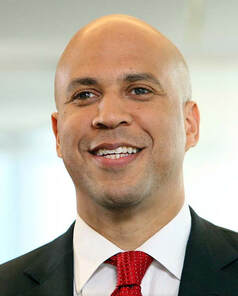Home | All Candidates | Arms Trade Treaty | Arms Sales to Saudi Coalition | Firearms Export Oversight
Cory Booker
Born in 1969, Cory Booker received a B.A. from Stanford in 1991 and an M.S. in 1992, followed by an M.A. from Oxford in 1994 and a J.D. from Yale Law School in 1997. He began his political career as a city councilor in Newark, New Jersey, from 1998 to 2002, becoming mayor of Newark from 2006 to 2013. In 2013 he became Senator from New Jersey, a position he currently holds.
Campaign Website |
Arms Trade Treaty
Booker's position on this issue is unknown. In 2015, he voted against a Senate resolution aimed at prohibiting the U.S. expending resources implementing the treaty. He has stated that current international oversight of the global arms trade is inadequate, but in the Amnesty International questionnaire that explicitly discussed the treaty, his response did not mention it.
Response to Amnesty International Questionnaire, June 2019
Question:“Sales of weapons should reflect the values we want to see in the world, including respect for civilian lives and schools, hospitals, and other institutions that serve non-combatants. I have been horrified by how our weapons of war have been used by Saudi Arabia and the UAE in the conflict in Yemen. The toll taken in the lives of innocent men, women, and children has been extraordinary, and must be stopped. In the Senate, I have fought alongside colleagues on both sides of the aisle to end sales to countries that have engaged in human rights violations, including the Philippines, Nigeria, Bahrain, Saudi Arabia, and others. Unfortunately, it is clear that the use of weapons is not being adequately monitored by the Trump Administration.”
- Arms sales: In 2019, the United States announced it would revoke its signature of the Arms Trade Treaty, a landmark instrument that ensures arms transfers are not used to fuel conflicts, atrocities, and abuses. Two of the United States’ largest weapons importers are Saudi Arabia and the United Arab Emirates, which have used weapons to commit human rights violations against Yemeni children and civilians and to blockade ports of entry to restrict aid from entering Yemen, thereby placing 11 million Yemenis at risk of famine. Nonetheless, the U.S. continues to build the military capacity of the Saudi-Emirati coalition, making the U.S. complicit in creating the worst humanitarian crisis in the world.
- What can the U.S. do to ensure U.S. arms are not used to perpetuate human rights violations and violations of international humanitarian law?
Arms Sales to Saudi Coalition
Booker explicitly supports ending arms sales and military support to the Saudi-led coalition fighting in Yemen. He voted (See also S.J. Res. 36, 38) June 20, 2019 to prevent arms sales and cosponsored S.J. Res. 7, the War Powers Resolution, aimed at stopping military support (see resource page).
Response to Council on Foreign Relations questionnaire, July 30, 2019
“We must be a nation that leads with our values. We need a reset in our relationship with Saudi Arabia, starting with an end to U.S. arms sales and transfer of nuclear technology. I have voted to block arms sales to Saudi Arabia over human rights abuses and killings of innocent civilians in Yemen.”
Firearms Export Oversight
Booker’s position on this issue is unknown. He supports banning assault-style weapons domestically, having cosponsored a Senate bill on this topic, but has not directly addressed broader export oversight rules.
"Cory’s Plan to End the Gun Violence Epidemic", Medium, May 6, 2019
"We will ban assault weapons and close the loopholes that allow people who should never have a gun to get one."

